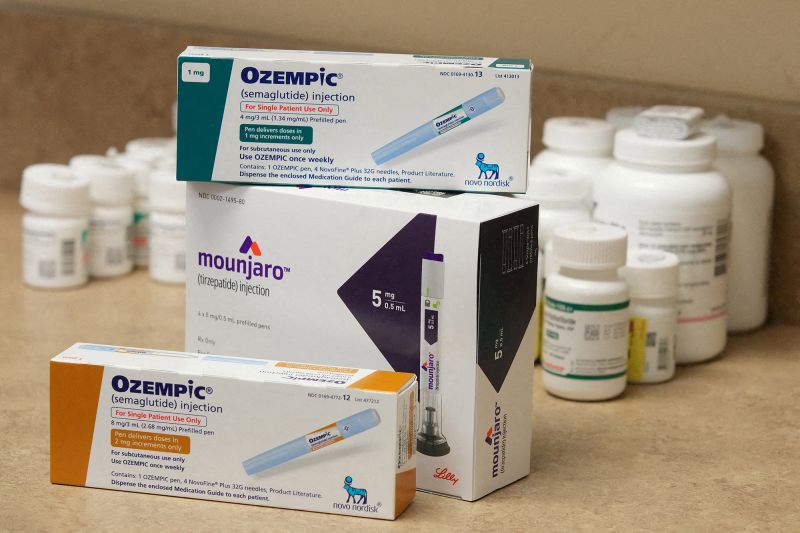Popular GLP-1 medications approved for weight loss, diabetes, and heart disease may have untapped potential to reduce the risks of substance abuse disorders, psychosis, infections, some kinds of cancer and dementia, a sweeping new study suggests.
The research also points to important and perhaps underappreciated risks of these drugs. These risks primarily involved the digestive system and included nausea and vomiting, stomach pain, heartburn and gastroparesis, or stomach paralysis. Beyond the gut, people who took GLP-1 medications were also more likely to be diagnosed with problems in their bones and joints, like arthritis and tendinitis, compared with people taking other medications to manage their blood sugar.
Out of 175 different outcomes researchers included in the study, they found people who took GLP-1 medications had lower risks of 42 different health outcomes and higher risks for 19. Some of the biggest risk reductions were for shock, aspiration pneumonia, liver failure, lung failure and cardiac arrest.
Though they found more benefits associated with the GLP-1 drugs than risks, study author Dr. Ziyad Al-Aly, who is chief of research and development at the VA St. Louis Health Care System, said people shouldn’t take that as an unconditional green light.
“It’s hard to make a blanket recommendation, because the side effects are real,” Al-Aly said. “I think people should have a conversation with their practitioners or their doctor or provider and do their own individualized risk benefit analysis,” he said.
Though people have shared personal stories of the medications’ sometimes surprising side effects, such as pregnancy, and individual studies have hinted at new benefits and risks, there have been few studies that have been able to take a comprehensive look at how these medications, which include Ozempic, Wegovy, Mounjaro and Zepbound, may change a person’s overall health.
The study, published Monday in the journal Nature Medicine, is one of the first big-picture looks at the benefits and risks of these new drugs, which rapidly made an impact on health care, insurance coverage, the grocery industry, and even the economy of an entire country (Denmark, where Novo Nordisk, the maker of Ozempic and Wegovy is based.) These drugs have also been given partial credit for a recent dip in obesity rates in the US, which dropped in 2023 for the first time in over a decade.
For the investigation, a team led by Al-Aly sifted through the records of nearly 2 million people with diabetes who were treated by the Veterans Health Administration for an average of almost four years between October 2017 and the end of December 2023.
It compared nearly 216,000 people who were prescribed GLP-1 medications to people prescribed three other kinds of medications to lower their blood sugar, as well as those who enrolled in the system with diabetes who continued to take the medications they had already been prescribed without any changes to their therapy, meaning they didn’t start a new drug during this time. All told, the study utilized the medical histories of 2.4 million people.
Al-Aly used these records to build what he calls “an atlas of association,” or a wide-ranging picture of the risks and benefits of the drugs throughout the body.
Others said the study was helpful in thinking about the medications on a larger scale.
“It’s a very interesting study,” said Dr. Scott Butsch, who is director of obesity medicine at the Cleveland Clinic in Ohio, who was not involved in the research. “This paper extends our current knowledge of the effectiveness of this class of medications.”
Weighing benefits and risks
The greatest risk increases were seen for nausea and vomiting, kidney stones, gastroesophageal reflux disease or GERD, sleep disturbances and non-infectious gastroenteritis, which is inflammation of the digestive tract which can cause nausea, vomiting, diarrhea and stomach cramps.
The increased risk of nausea and vomiting will probably not come as a surprise to anyone who has taken these medications. The increased risk of kidney stones, on the other hand, might be less familiar.
“That may be related to the possibility that people, when they are on GLP-1, they definitely eat a whole lot less to lose weight, but they also hydrate themselves less,” Al-Aly said in a news briefing. “Perhaps that chronic dehydration leads to increased risk of stones.”
The drugs also appeared to be linked to kidney benefits, too. There were decreased risks that a person might experience chronic kidney disease and urinary tract infections.
The study has several important caveats. First, most of the patients whose records were used for the study were older, White and male, which is typical of the population served by the VA health system.
On average, people in the study were over age 65, more than 70% were White, and more than 92% were men, so the study results may not apply to other types of GLP-1 users. And everyone in the study had diabetes, so no one was taking these medications solely for weight loss. While diabetes and obesity pose many of the same risks to the body, they aren’t exactly the same, so it’s hard to know whether that also influenced the results.
For example, the study found GLP-1 users had a 7% greater risk of developing gastroparesis compared with people who were using other types of medications to lower their blood sugar. But having diabetes also puts a person at increased risk for developing gastroparesis, so it’s difficult to know if the risks would look the same for people who don’t have the condition.
But these kinds of studies are very good at generating new research questions — like why would medication that helps people lose weight be associated with an increased risk of arthritis, as this study showed?
The study is also observational, which means it can’t prove cause and effect. Very often in medicine, observational studies find that two things often happen at the same time — for example, countries with high chocolate consumption produce more Nobel prize winners per capita. But that doesn’t mean eating chocolate makes you smarter.
“It’s kind of almost like a road map for future studies, but it also gives me confirmation of some of the hunches I’ve had, and maybe it might affect some of my decision making with patients,” said Dr. Melanie Jay, who studies the treatment and prevention of obesity at NYU Langone Health. She was not involved in the research.
Improvements seem related reductions in fat and inflammation
Al-Aly said when he looks at his results, he thinks the drugs probably act via two different pathways. One relates to the reduction in obesity and the risks that go with that. The other has to do with reducing inflammation.
He said there’s also appears to be an effect in the brain, which has GLP-1 receptors, and in the lining of the blood vessels.
Some of the most pronounced brain benefits found in the study related to reduced risks for psychosis and schizophrenia.
“I was surprised. Like, why would they work in schizophrenia and psychotic disorders?” Al-Aly said. He was surprised, when he searched the medical literature, that this finding hadn’t come out of the blue. There have been some studies suggesting that GLP-1 medications reduce symptoms of schizophrenia in animals.
The drugs were linked to small reduction — 12% — in the risk of dementia and other neurocognitive disorders, including Alzheimer’s disease. Al-Aly thinks that might be an underestimate because even though the study followed huge numbers of people, it covered only about four years, so they might have seen more Alzheimer’s cases if the study had gone on for longer, which might have translated to a larger benefit.
There were other benefits seen in the brain, too. GLP-1 drugs also seemed to reduce a person’s risk for seizures and bleeding strokes. As some people have already noticed, the drugs appear to cut the risk for some substance use disorders, including addictions to opioids, alcohol, stimulants and sedatives.
More research needed
Jay said she had hoped to see more information around eating disorders, including binge-eating disorder. The drugs famously turn off what users call “food noise” or intrusive thoughts of food. The study did show a reduction in bulimia, or binge-eating with purging, but didn’t contain any information specifically about binge-eating disorder, where people don’t purge, or anorexia, where people restrict calories. There have been anecdotal reports that GLP-1 medications may contribute to anorexia by blunting hunger cues for people who’ve developed an unhealthy aversion to food.
“I’ve had a few patients with bulimia, and it’s not certain whether it would be safe or not to put them on it,” Jay said. “But the fact that it, like, is associated with an improvement would make me a little bit feel a little bit better about putting someone on that medicine if they have bulimia, as long as I’m following them closely,” she said.
And contrary to some fears that GLP-1 medications might increase the risk of depression and suicidality, as other weight loss drugs have in the past, this study found that these newer medications were linked to a lower risk of suicidal ideation, suicide attempts, and the intention to self-harm.
Another surprising link had to do with aspiration pneumonia, or the risk that someone might vomit and some of that undigested food might get into their lungs and cause an infection. Anesthesiologists have been especially concerned about this risk after discovering patients on GLP-1 medications have gone into surgeries with lots of food left in their stomachs, which puts them at risk for this complication.
The new study found a lower risk for aspiration pneumonia in patients taking GLP-1 medications, compared with people who didn’t.
“But here it is, and you’re looking at a VA population, which is usually an older, sicker population, and you’re seeing actually potentially decreased risks,” of aspiration pneumonia, Butsch said.
It’s not clear how the drugs might be tied to that decreased risk, however, and this might be one of those outcomes that needs further study.
- Sign up here to get The Results Are In with Dr. Sanjay Gupta every Friday from the CNN Health team.
The study showed people taking GLP-1 drugs also had lower risks of some kinds of infections including pneumonia, sepsis and bacterial infections. They were also less likely than those taking other medications to experience some kinds of clotting disorders like pulmonary embolisms and deep vein thrombosis.
Al-Aly said he was inspired to do the study by the story of statin drugs, like Lipitor, which are prescribed to treat high cholesterol. After those were introduced, studies began to suggest they, too, had benefits which extended beyond their use in preventing heart attacks and strokes, such as lowering the risk of some types of cancer and perhaps protecting the brain from dementia.
He said studies like this one weren’t possible when those drugs first became available, but he thinks the role of big data in getting a wider look at what drugs might do, is important to consider.
While all of these potential benefits are exciting, experts said they need much more study, and even then, whether they might ever be utilized as a treatment for schizophrenia, for example, would depend on a number of factors: how much and how consistently they work, as well as how they compare to treatments that are already available. There’s at least one study underway to try to answer some of those questions.
Other studies are also testing to see whether drugs like Ozempic might be helpful in the setting of substance abuse.


